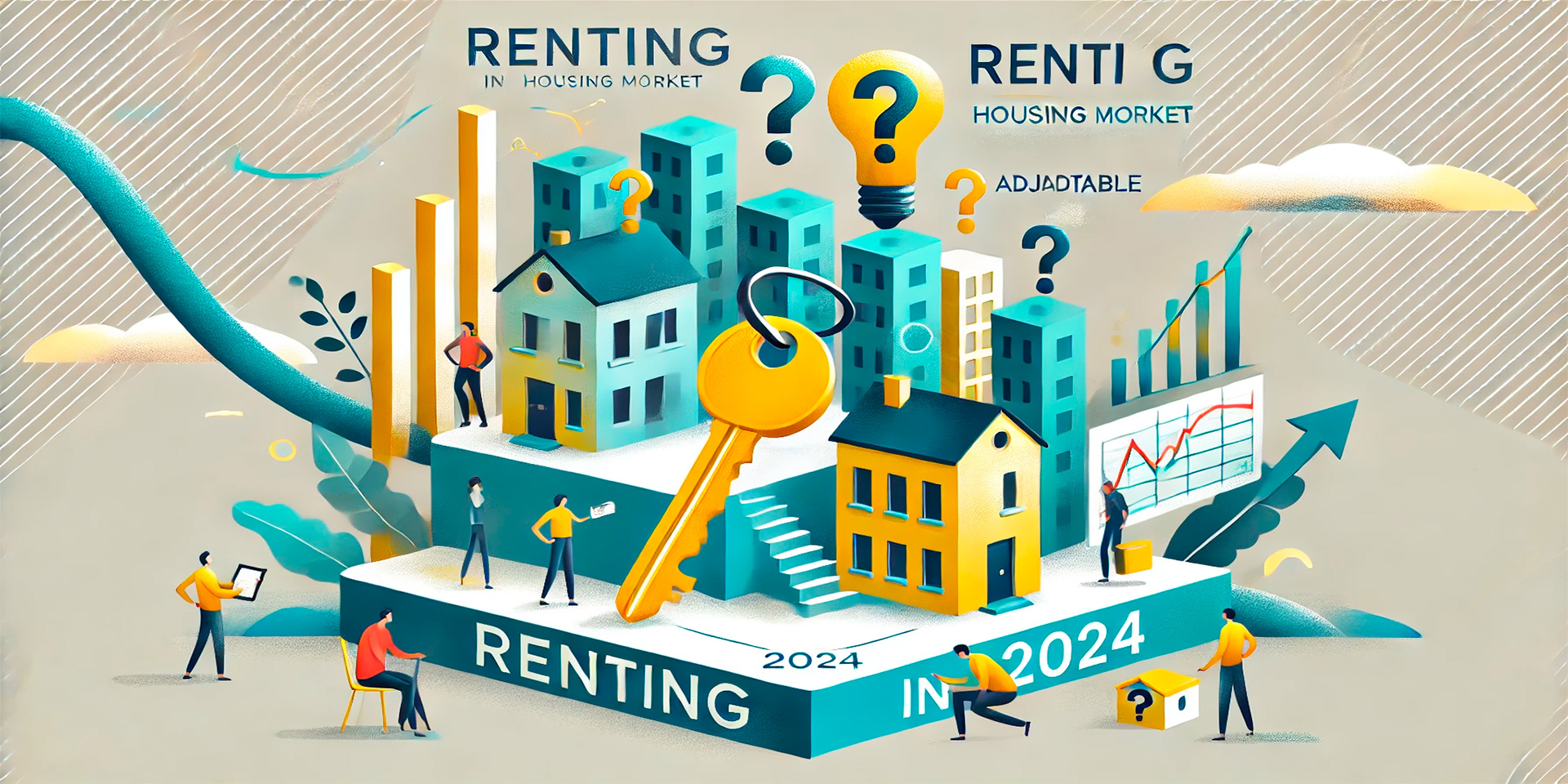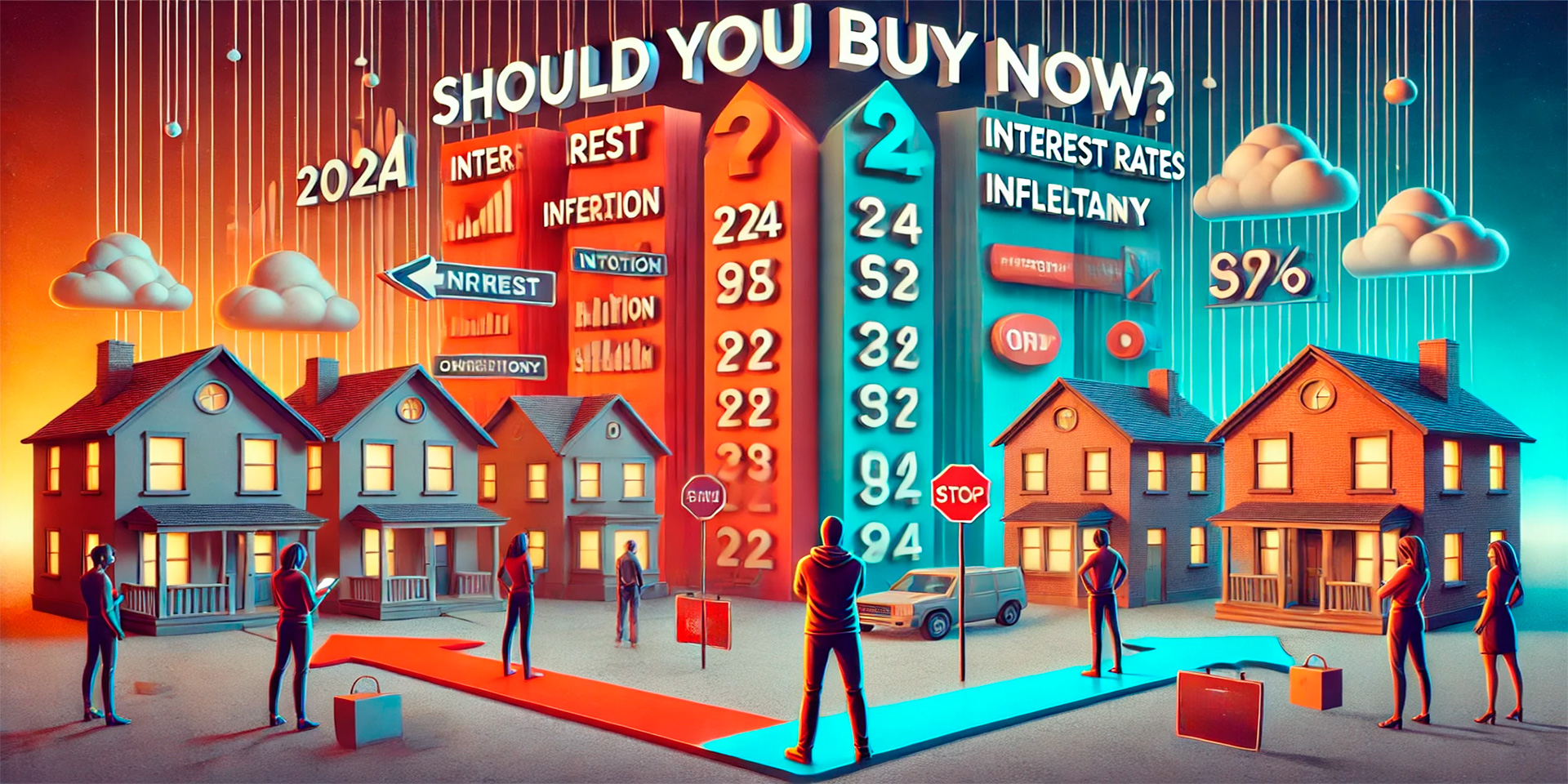With economic uncertainty and fluctuations in the housing market, more people are questioning whether renting or buying is the smarter option in 2024. In a volatile market, where interest rates are rising and home prices are unpredictable, renting offers flexibility and a lower risk profile for those hesitant to commit to a long-term purchase. This article explores why renting could be the smarter choice in today’s market conditions.
Market Volatility and Rising Costs
One of the primary reasons that renting is becoming more attractive in 2024 is due to the volatility in the housing market. Factors such as rising interest rates, fluctuating home prices, and economic uncertainty are making homeownership more complex and expensive.
Rising Interest Rates
The Federal Reserve’s recent decisions to raise interest rates have a significant impact on the cost of borrowing for homebuyers. As mortgage rates increase, so do monthly payments for homeowners. This makes homeownership less affordable, especially for first-time buyers who are already navigating a tight housing market.
For those considering buying a home, the higher cost of borrowing can push a dream home out of financial reach. Renting, on the other hand, allows for greater predictability in housing costs, as renters are not affected by rising mortgage rates. Renters can typically budget for their rent without the worry of fluctuating interest rates impacting their monthly payments.
Uncertain Housing Prices
In addition to rising interest rates, home prices in many regions are still at elevated levels. While some markets are experiencing price corrections, others remain highly competitive, driving prices higher. The risk of overpaying for a home during a peak market can lead to long-term financial strain if prices decrease after a purchase is made.
Renting provides an option to avoid the risk of purchasing at the top of the market. Renters have the ability to wait for the housing market to stabilize before committing to buying, potentially benefiting from lower prices in the future.

Flexibility in an Unpredictable Market
One of the key advantages of renting is the flexibility it offers, particularly during times of market volatility. While buying a home ties you to a property and a mortgage for the long term, renting allows you to adjust more quickly to changing circumstances.
Mobility and Job Flexibility
For individuals or families who anticipate changes in their employment or location, renting offers the freedom to move without the burden of selling a home. In an uncertain economy, where job relocations, remote work opportunities, or industry changes are common, the ability to move easily is a significant benefit.
Renters are typically only committed to a lease term, often for one year or less, making it easier to relocate if job opportunities or personal circumstances change. Homeowners, on the other hand, must consider the challenges of selling a property, which can be both time-consuming and costly.
Lower Upfront Costs
Buying a home requires a significant financial investment upfront, including a down payment, closing costs, and maintenance expenses. In contrast, renting typically requires a security deposit and possibly first and last month’s rent, but these costs are considerably lower than the outlay for homeownership.
For those who want to avoid depleting their savings, renting is an option that offers lower upfront costs and preserves financial flexibility. This is especially beneficial in uncertain markets where holding onto liquidity may be a smarter financial move.
Avoiding Market Risks
In a volatile market, the risks associated with homeownership become more pronounced. Property values can fluctuate dramatically, and homeowners are exposed to potential losses if the housing market declines.
Mitigating the Risk of Falling Home Prices
One of the greatest risks of buying a home in a volatile market is the potential for falling property values. If home prices drop after you purchase, you could find yourself owing more on your mortgage than the property is worth, a situation known as negative equity or being “underwater” on your mortgage. This can make it difficult to sell the home without taking a loss, especially if you need to relocate or downsize.
Renters, on the other hand, are not exposed to the risk of declining property values. They can simply move when their lease ends, without the worry of losing money on a real estate investment.
Avoiding Maintenance and Repair Costs
Homeownership comes with the responsibility of maintaining the property, which can lead to unexpected expenses for repairs and upgrades. From roof repairs to appliance replacements, these costs can add up and create financial strain for homeowners, especially if they haven’t budgeted for such contingencies.
Renters are not responsible for most maintenance costs, as landlords are typically required to handle repairs. This can be a significant financial relief, particularly in older properties that may need frequent upkeep. Renting allows individuals to avoid these unforeseen expenses, giving them greater control over their budget.

Short-Term vs. Long-Term Financial Considerations
While homeownership has long been considered a key part of the American Dream, it may not always make sense in the short term, especially in an unpredictable market. Renting can be a more financially sound decision for individuals who prefer short-term flexibility or those who are not yet ready to commit to the long-term financial responsibilities of owning a home.
Saving for a Down Payment
For many potential buyers, saving for a down payment can be a significant hurdle, particularly when home prices are high. Renting allows you to save more over time without the pressure of committing to a mortgage. By continuing to rent, you can accumulate a larger down payment, which can lead to better mortgage terms and lower monthly payments when you’re ready to buy.
Additionally, with higher interest rates in 2024, saving for a more substantial down payment can help you qualify for a mortgage with more favorable terms, allowing you to borrow less and reduce your overall cost of homeownership.
Investment Flexibility
Instead of tying up a large portion of your savings in a home, renting allows you to maintain greater investment flexibility. You can choose to invest your money in other areas, such as the stock market, retirement accounts, or other ventures, which may offer higher returns in the long term.
In uncertain economic times, having liquid assets and diversified investments can be a smart financial strategy. Renting can give you the freedom to invest your money in more flexible and potentially higher-yielding opportunities while waiting for the housing market to stabilize.
When Renting Is the Smarter Option
While buying a home can be a great investment in the right circumstances, there are several scenarios in which renting is the smarter option, especially in a volatile market:
- If you’re unsure about your long-term plans, such as job stability or location preferences, renting offers more flexibility without the commitment of homeownership.
- If interest rates are high and you’re concerned about affordability, renting allows you to avoid locking in a mortgage with high payments.
- If you want to avoid the risks associated with fluctuating home prices, renting lets you stay flexible and avoid potential losses in a declining market.
- If you need time to save for a down payment or improve your credit score, renting gives you the breathing room to prepare for homeownership in the future.
Conclusion: Renting in 2024
In 2024, with the housing market experiencing significant volatility, renting may offer a smarter, more flexible option for many individuals and families. Rising interest rates, uncertain home prices, and economic unpredictability make renting an attractive choice for those who value flexibility, mobility, and lower financial risk.
While homeownership remains a worthwhile goal for many, renting can provide short-term stability and the freedom to adapt to changing market conditions. By carefully weighing your financial situation, long-term plans, and the current state of the housing market, you can determine whether renting is the best choice for your needs in 2024.


